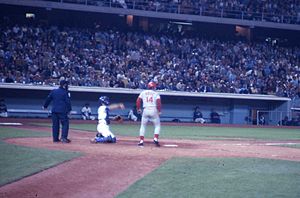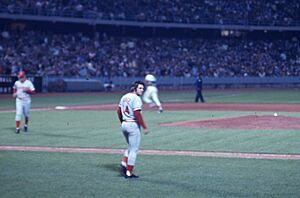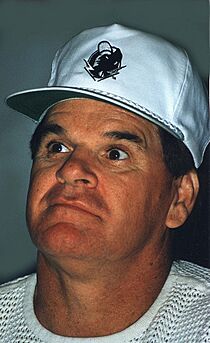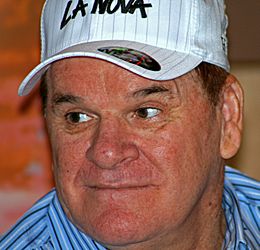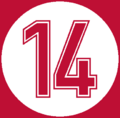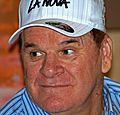Pete Rose facts for kids
Quick facts for kids Pete Rose |
|||
|---|---|---|---|
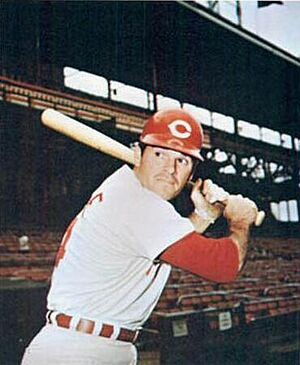
Rose in 1972
|
|||
| Outfielder / Infielder / Manager | |||
| Born: April 14, 1941 Cincinnati, Ohio, U.S. |
|||
| Died: September 30, 2024 (aged 83) Las Vegas, Nevada, U.S. |
|||
|
|||
| debut | |||
| April 8, 1963, for the Cincinnati Reds | |||
| Last appearance | |||
| August 17, 1986, for the Cincinnati Reds | |||
| MLB statistics | |||
| Batting average | .303 | ||
| Hits | 4,256 | ||
| Home runs | 160 | ||
| Runs batted in | 1,314 | ||
| Managerial record | 412–373 | ||
| Winning % | .525 | ||
| Teams | |||
As player
As manager
|
|||
| Career highlights and awards | |||
MLB records
|
|||
Pete Rose (born April 14, 1941 – September 30, 2024) was a famous American baseball player and manager. People often called him "Charlie Hustle" because of how hard he played. He played in Major League Baseball (MLB) from 1963 to 1986. Most of his career was with the Cincinnati Reds, who were known as the Big Red Machine in the 1970s. He also played for the Philadelphia Phillies and the Montreal Expos. After his playing career, he managed the Reds from 1984 to 1989.
Pete Rose holds many MLB records, including the most hits (4,256), games played (3,562), and at-bats (14,053). He won three World Series championships, three batting titles, and an MVP Award. He also won two Gold Glove Awards and the Rookie of the Year Award. He was an All-Star 17 times, playing in five different positions.
In 1989, Pete Rose was banned from baseball because of accusations that he bet on baseball games while he was a player and manager for the Reds. This ban meant he could not be in the Baseball Hall of Fame. After many years of saying he didn't do it, he admitted in 2004 that he had bet on baseball, including on his own team. His ban from the Hall of Fame is still a big discussion in baseball.
Contents
- Early Life and Baseball Start
- Playing Career Highlights
- Retirement as a Player
- Suspensions as a Manager
- Tax Issues
- MLB All-Century Team
- Admitting to Sports Gambling
- WWE Appearances
- Return to Managing (Briefly)
- Fox Sports Analyst
- Personal Life
- Records and Achievements
- Managerial Record
- Images for kids
Early Life and Baseball Start
Pete Rose was born in Cincinnati, Ohio, on April 14, 1941. His parents encouraged him to play sports, and he loved both baseball and football at Western Hills High School.
Even though he was small, Pete was a good football player. When he wasn't moved up to the main football team in his second year, he lost interest in school. His dad decided it was better for Pete to repeat a year of school so he could keep playing baseball and grow stronger.
In 1960, after high school, Pete played for a local amateur baseball team. He was amazing, hitting for a .626 batting average. His uncle, Buddy Bloebaum, was a scout for the Cincinnati Reds. Thanks to his uncle, the Reds decided to give Pete a chance. He signed a professional contract right after graduating.
Playing Career Highlights
Cincinnati Reds (1963–1978)
Becoming "Charlie Hustle"
Pete Rose got his big chance in 1963 during a spring training game when the Reds' main second baseman got hurt. During another spring training game, a famous pitcher named Whitey Ford gave Pete the nickname "Charlie Hustle." Ford meant it as an insult because Pete ran to first base even after getting a walk. But Pete loved the name and wore it like a badge of honor!
Pete made his first major league appearance on April 8, 1963. He got his first hit, a triple, on April 13. He finished the year hitting .273 and won the National League (NL) Rookie of the Year Award.
Early Success
In 1965, Pete Rose led the league in hits with 209. He also hit over .300 for the first of nine years in a row. In 1966, he hit a career-high 16 home runs. The next year, he changed positions from second base to right field.
In 1968, Pete started the season with a 22-game hitting streak. Even though he missed three weeks with a broken thumb, he still won his first NL batting title, hitting .335. The next year, 1969, he had his best batting average ever at .348. He also led the league in runs scored with 120.
1970 All-Star Game Collision
In the 1970 All-Star Game, Pete Rose was involved in a famous play. In the 12th inning, he scored the winning run by crashing into the catcher, Ray Fosse, at home plate. Fosse was badly hurt, suffering a fractured shoulder. This collision was a big moment in All-Star Game history.
Winning the MVP in 1973
In 1973, Pete Rose led the league with 230 hits and a .338 batting average. He won the NL MVP award and helped "the Big Red Machine" reach the playoffs. During a playoff game against the New York Mets, Pete slid hard into second base, causing a fight with Mets shortstop Bud Harrelson. Fans at the stadium started throwing things, and the game was almost stopped. Even though the Reds lost the series, Pete hit very well, with a .381 average.
The Big Red Machine Era
The Cincinnati Reds of the 1970s were known as "the Big Red Machine." They were one of the best teams in baseball history, with stars like Johnny Bench and Joe Morgan. Pete Rose was a key leader on this amazing team.
In 1975, Pete moved from the outfield to third base. This helped the team become even stronger and allowed another great player, George Foster, to play. In 1975, Pete was named the World Series MVP as the Reds won their first championship since 1940. He hit .370 in the series.
The Reds won the World Series again in 1976, sweeping both the playoffs and the World Series. This team is still the only one since 1969 to go undefeated in the postseason!
Breaking Records
On May 5, 1978, Pete Rose got his 3,000th career hit, becoming only the 13th player in MLB history to do so.
Later that year, from June 14 to August 1, Pete had a 44-game hitting streak! This was the longest hitting streak in the National League since 1897. He was chasing Joe DiMaggio's record of 56 games, but the streak ended when Gene Garber of the Atlanta Braves struck him out.
Philadelphia Phillies (1979–1983)
In 1979, the Philadelphia Phillies signed Pete Rose to a big contract, hoping he would help them win a World Series. He moved to first base for the Phillies.
With Pete, the Phillies won their first World Series title in 1980. In 1983, at 42 years old, Pete had a tough season, hitting only .245. He was benched sometimes, but he still played well in the playoffs.
Montreal Expos (1984)
In 1984, Pete Rose signed with the Montreal Expos. On April 13, 1984, exactly 21 years after his first hit, Pete got his 4,000th career hit! He became only the second player ever to reach 4,000 hits, joining Ty Cobb.
Return to Cincinnati (1984–1986)

On August 15, 1984, Pete Rose was traded back to the Reds. He immediately became the team's player-manager, meaning he played and managed at the same time. He was the last person in MLB to have this role.
On September 11, 1985, Pete broke Ty Cobb's all-time hits record with his 4,192nd hit. He ended his playing career with a total of 4,256 hits.
Retirement as a Player
 |
|
| Pete Rose's number 14 was retired by the Cincinnati Reds in 2016. |
Pete Rose officially retired as a player on November 11, 1986. He finished his career with a .303 batting average and many MLB and NL records. He was very proud of hitting .300 or better in 15 of his 24 seasons.
After retiring as a player, Pete continued to manage the Reds until August 1989. He ranks fifth in Reds history for managerial wins.
Suspensions as a Manager
Thirty-Day Suspension
On April 30, 1988, during a game against the New York Mets, Pete Rose got very angry about a call made by umpire Dave Pallone. Pete argued strongly and pushed the umpire. Touching an umpire is not allowed, so Pete was immediately thrown out of the game. Fans in Cincinnati started throwing objects onto the field. The game was stopped for 15 minutes.
The National League president, A. Bartlett Giamatti, suspended Pete Rose for 30 days. This was the longest suspension ever given to a manager for something that happened on the field.
Permanent Ban from Baseball
In 1989, there were reports that Pete Rose had bet on baseball games. MLB started an investigation. Pete said he had bet on other sports but denied betting on baseball.
The investigation found evidence that Pete had placed bets on many Reds games in 1987. On August 24, 1989, Pete Rose agreed to be placed on baseball's "ineligible list" permanently. This meant he was banned from baseball. In return, MLB agreed not to make a formal statement about the gambling accusations.
The rule Pete broke says: "Any player, umpire, or club, or league official, or employee, who shall bet any sum whatsoever upon any baseball game in connection with which the bettor has a duty to perform shall be declared permanently ineligible." This rule applies whether you bet for or against your team.
Trying to Get Back In
Since his ban, Pete Rose has tried several times to be allowed back into baseball. He applied for reinstatement in 1992, 1998, 2003, 2015, 2020, and 2022. However, each time, the Commissioner of Baseball has rejected his requests. They have said he hasn't been fully honest about his gambling and that he still bets on baseball, even if it's legal now.
Tax Issues
In 1990, Pete Rose admitted to not reporting all his income from selling autographs and from horse racing winnings on his tax returns. He was sentenced to five months in prison and had to pay a fine and back taxes. He also had to do 1,000 hours of community service.
MLB All-Century Team
In 1999, Pete Rose was chosen as an outfielder for the Major League Baseball All-Century Team. This team was picked by fans and experts as the 100 greatest players of the past century.
Even though he was banned, Pete was allowed to attend the ceremony for the All-Century team before a World Series game in 1999. He received the loudest cheers from the crowd.
Pete Rose has been allowed to participate in some other special events, like the 25th anniversary of his 4,192nd hit and the 2015 MLB All-Star Game in Cincinnati. In 2016, the Reds retired his jersey number, 14, which MLB had to approve.
Admitting to Sports Gambling
In his book My Prison Without Bars, published in 2004, Pete Rose publicly admitted that he had bet on baseball games and other sports while he was playing for and managing the Reds. He said he always bet on his team to win and never against them. He hoped this admission would help him get back into baseball.
However, some people were upset that he denied it for 15 years before admitting it. Even after his admission, the ban remained. In 2015, ESPN reported that their own investigation found records of bets made by Rose while he was still a player-manager.
In 2010, at a special event, Pete Rose cried and apologized for "disrespecting baseball." He said he loved the fans, the game, and Cincinnati baseball.
WWE Appearances
Between 1998 and 2000, Pete Rose made several funny appearances at World Wrestling Federation's (now WWE) annual WrestleMania events. He often got into trouble with the wrestler Kane, who would perform his finishing move, the "Tombstone Piledriver," on Rose.
In 2004, Pete Rose was inducted into the "Celebrity Wing" of the WWE Hall of Fame. He was the first celebrity to receive this honor. He also appeared on WWE's WWE Raw in 2010.
Return to Managing (Briefly)
On June 16, 2014, Pete Rose returned to managing a baseball team for one game. He was a guest manager for the Bridgeport Bluefish, a team in an independent league not connected to MLB. This appearance did not break his lifetime ban. He coached first base and signed autographs for fans.
Fox Sports Analyst
In 2015, Pete Rose was hired by Fox Sports to be a guest analyst for their MLB coverage. He appeared on pregame shows and other baseball programs. He worked for Fox Sports until August 2017.
Personal Life
Pete Rose married Karolyn Englehardt in 1964, and they had two children, Fawn and Pete Rose Jr.. They divorced in 1980. He later acknowledged another daughter, Morgan Erin Rubio.
In 1984, Pete married Carol J. Woliung. They had two children, Tyler and Cara. Cara has worked as a television actress. His son, Pete Rose Jr., played minor league baseball for 16 years and had a short time in the major leagues with the Reds in 1997.
Pete Rose earned a lot of money from public appearances and signing autographs. He often signed autographs in Cooperstown, New York, during the Hall of Fame induction weekend.
Death
Pete Rose passed away at his home in Las Vegas, Nevada, on September 30, 2024, at the age of 83.
Records and Achievements
Pete Rose won many awards during his career, including the 1968 Hutch Award, the 1969 Lou Gehrig Memorial Award, and the 1976 Roberto Clemente Award. Even though he is banned from the Hall of Fame, he received votes in his first few years on the ballot.
He was selected for the National League All-Star team 17 times. He was the National League's Most Valuable Player in 1973 and led the league in batting average three times (1968, 1969, 1973).
- Major League records:
- Most career at-bats – 14,053
- Most career plate appearances – 15,890
- Most career hits – 4,256
- Most career singles – 3,215
- Most career times on base – 5,929
- Most career outs – 10,328
- Most career games played – 3,562
- Only player to play at least 500 games at five different positions – 1B (939), LF (671), 3B (634), 2B (628), RF (595)
- Most seasons with 200 or more hits – 10 (tied with others)
- Most consecutive seasons with 100 or more hits – 23
- National League records:
- Most years played – 24
- Most career runs – 2,165
- Most career doubles – 746
- Longest consecutive-game hitting streak (since 1900) – 44 games
Managerial Record
| Team | Year | Regular season | Postseason | |||||||
|---|---|---|---|---|---|---|---|---|---|---|
| Games | Won | Lost | Win % | Finish | Won | Lost | Win % | Result | ||
| CIN | 1984 | 41 | 19 | 22 | .463 | 5th in NL West | – | – | – | |
| CIN | 1985 | 162 | 89 | 72 | .552 | 2nd in NL West | – | – | – | |
| CIN | 1986 | 162 | 86 | 76 | .531 | 2nd in NL West | – | – | – | |
| CIN | 1987 | 162 | 84 | 78 | .519 | 2nd in NL West | – | – | – | |
| CIN | 1988 | 23 | 11 | 12 | .478 | 2nd in NL West | – | – | – | |
| 111 | 64 | 47 | .577 | |||||||
| CIN | 1989 | 125 | 59 | 66 | .472 | Fired | – | – | – | |
| CIN total | 786 | 412 | 373 | .525 | 0 | 0 | – | |||
| Total | 786 | 412 | 373 | .525 | 0 | 0 | – | |||
Images for kids
 In Spanish: Pete Rose para niños
In Spanish: Pete Rose para niños
- 3,000-hit club
- List of Major League Baseball hit records
- List of Major League Baseball doubles records
- Major League Baseball scandals
- DHL Hometown Heroes
- Major League Baseball All-Century Team
- List of Major League Baseball career records
- List of Major League Baseball single-season records
- List of Major League Baseball career hits leaders
- List of Major League Baseball career doubles leaders
- List of Major League Baseball career triples leaders
- List of Major League Baseball career runs scored leaders
- List of Major League Baseball career runs batted in leaders
- List of Major League Baseball career stolen bases leaders
- List of Major League Baseball batting champions
- List of Major League Baseball annual runs scored leaders
- List of Major League Baseball annual doubles leaders
- List of Major League Baseball player-managers
- Major League Baseball consecutive games played streaks
- Major League Baseball titles leaders


